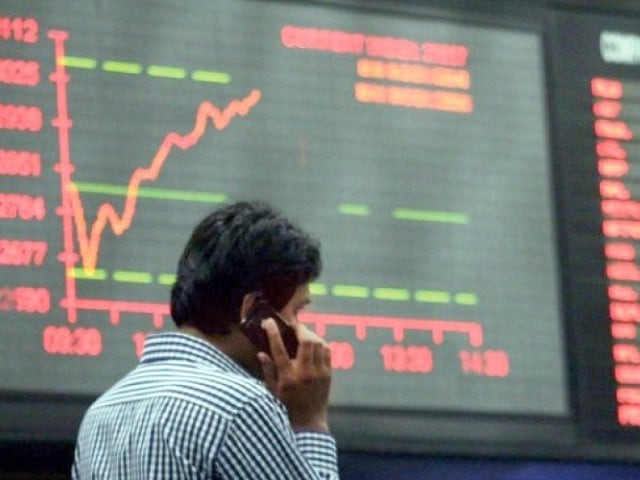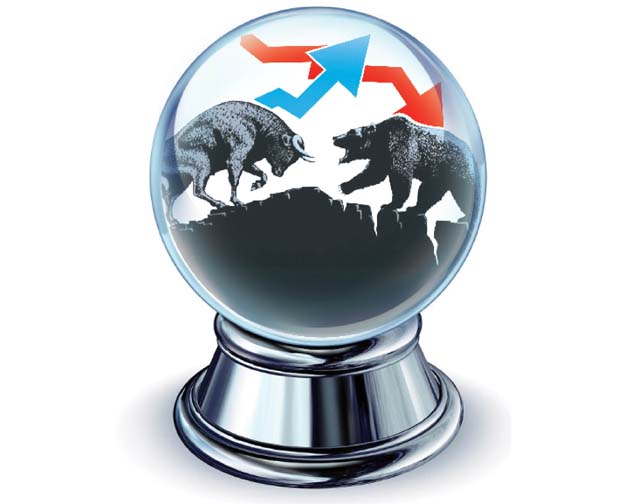At PSX, money may have been lost, but not hope
Experts and analysts expect KSE-100 Index to recover in post-election period

Experts and analysts expect KSE-100 Index to recover in post-election period. PHOTO: FILE
But investors, especially those vested in the stock market, may have lost money, but rarely lose hope.
Analysts and experts now believe the worst could very well be over for investors at the Pakistan Stock Exchange (PSX). The KSE-100 Index, a benchmark for market performance, has already given a taste of things to come. It gained over 2% a day before the elections, but only after losing close to the same amount a day earlier.
A majority of participants and stakeholders have now reached consensus that stocks could now see an upside on a path that was unclear before.
The pace of the recovery, however, would largely depend on the outcome of the general elections scheduled for Wednesday (today).
Market watch: KSE-100 suffers worst fall of 2018, finishes 1,219 points lower
A clear majority for a political party would mean quicker decision-making and bode well for the economy. On the other hand, a hung parliament could stall the same process, and create uncertainty - a scenario investors abhor.

What analysts and experts say
JS Global Research Head of Equity Sales Atif Zafar said he anticipates a rally in the post-election period. "The stock market has maintained an uptrend in the post-election era in four of the previous five elections," said Zafar.
However, Arif Habib, the chief executive of Arif Habib Group, said timely elections and smooth transition of democratic power - only the second time in Pakistan's history - will weigh more on investor sentiment than the outcome.
"Irrespective of any form of government (simply majority or hung parliament) that comes into power, the KSE-100 would go back to 50,000 points by the end of December," he said.
His statement is a reminder to stock market investors of the healthy bull run the PSX enjoyed in calendar year 2016, when Pakistan emerged as the top-performing market in Asia. Inclusion in the MSCI Emerging Markets Index and an economy on course to register higher GDP growth, along with a stable government in place, gave impetus to the bullish sentiment.
However, change in the taxation regime and lower-than-expected inflows post-MSCI inclusion, along with upheaval in the political arena, has more than disturbed the growth.
"Two factors would dominate recovery in the post-election era. Firstly, stock prices have dropped to attractive buying levels and secondly, political instability would come to an end," Habib added.
AKD Securities Chief Executive Officer Farid Alam said the worst is behind investors. "The elections would bring an end to the worst [political developments] in Pakistan. Political instability and noise, which painted a negative image of Pakistan and its markets, [fiscal, trade and current account] deficits on the higher side; all this would become part of history with the upcoming election.
"If any of the two leading political parties, Pakistan Tehreek-e-Insaf (PTI) or Pakistan Muslim League-Nawaz (PML-N), takes over 100 seats in the National Assembly, it would give clarity to the market to maintain its momentum," he said.
Amid upheaval, Rs857b wiped off Pakistan’s stock market
The pace of the recovery would also depend on the speed with which foreign exchange reserves, which have dropped to an alarming level, recover.
"If the incoming government quickly arranges [borrows] $10-12 billion from unilateral and multilateral donors or lenders, it would help the economy and the market recover quickly," he added.
He, however, said he expects the rupee to weaken further to Rs132-133 against the US dollar from the current Rs128.5 in the post-election period. "This would also impact the market accordingly," he said.
All, however, agreed that banks, export-oriented companies (like value-added textile), import substitute companies (like chemicals and fertilisers) and independent power producers would lead the rally.
They expected mutual funds and foreign investors (the two large segments of investors at the PSX) would return to their buying spree after the rupee settles.


















COMMENTS
Comments are moderated and generally will be posted if they are on-topic and not abusive.
For more information, please see our Comments FAQ